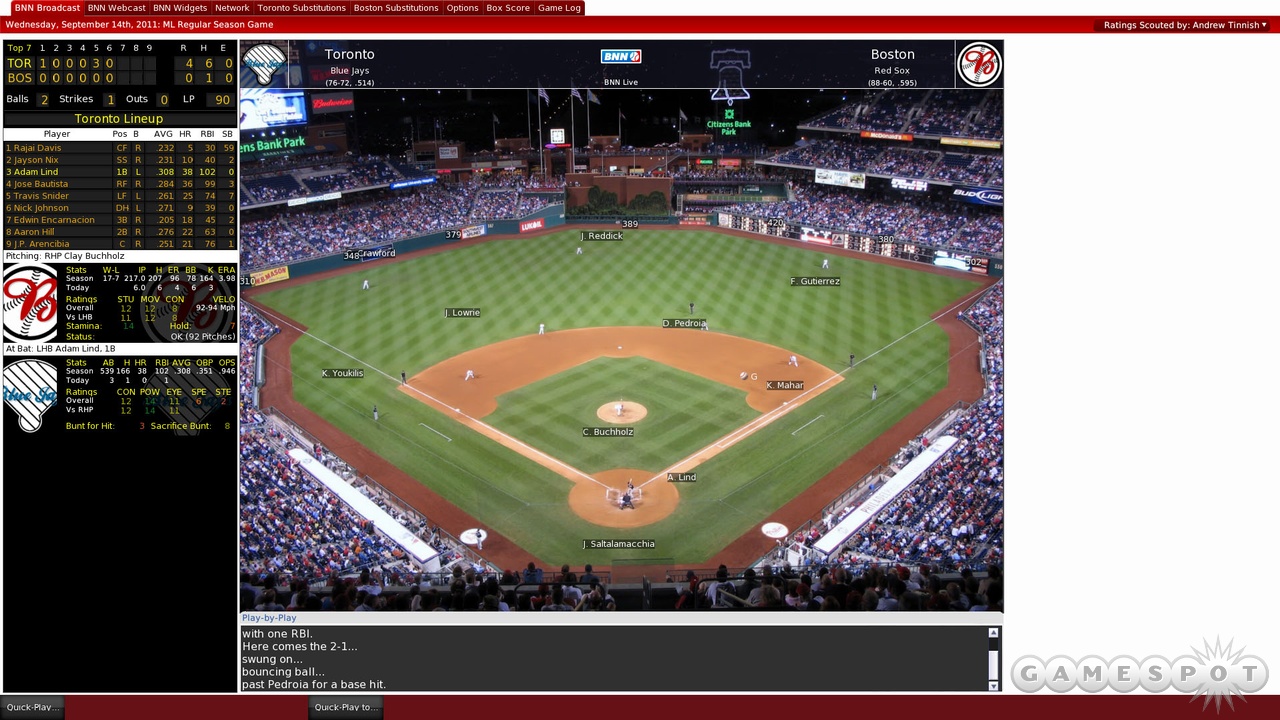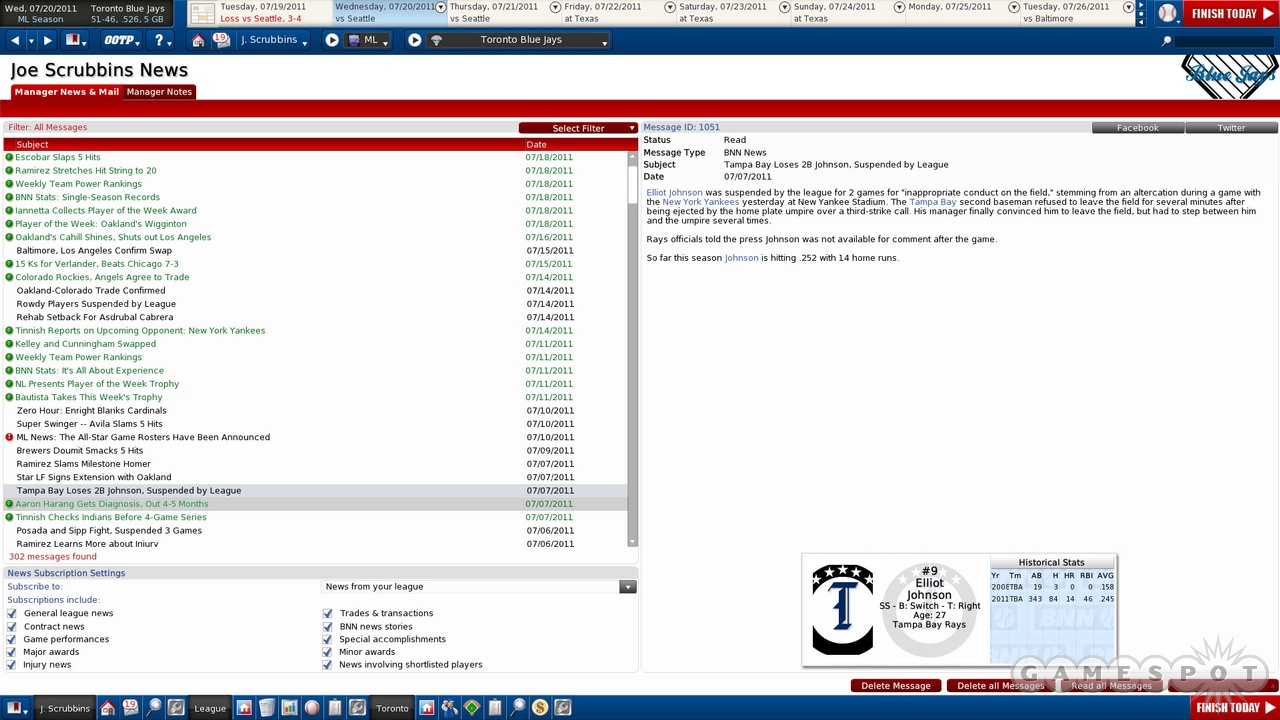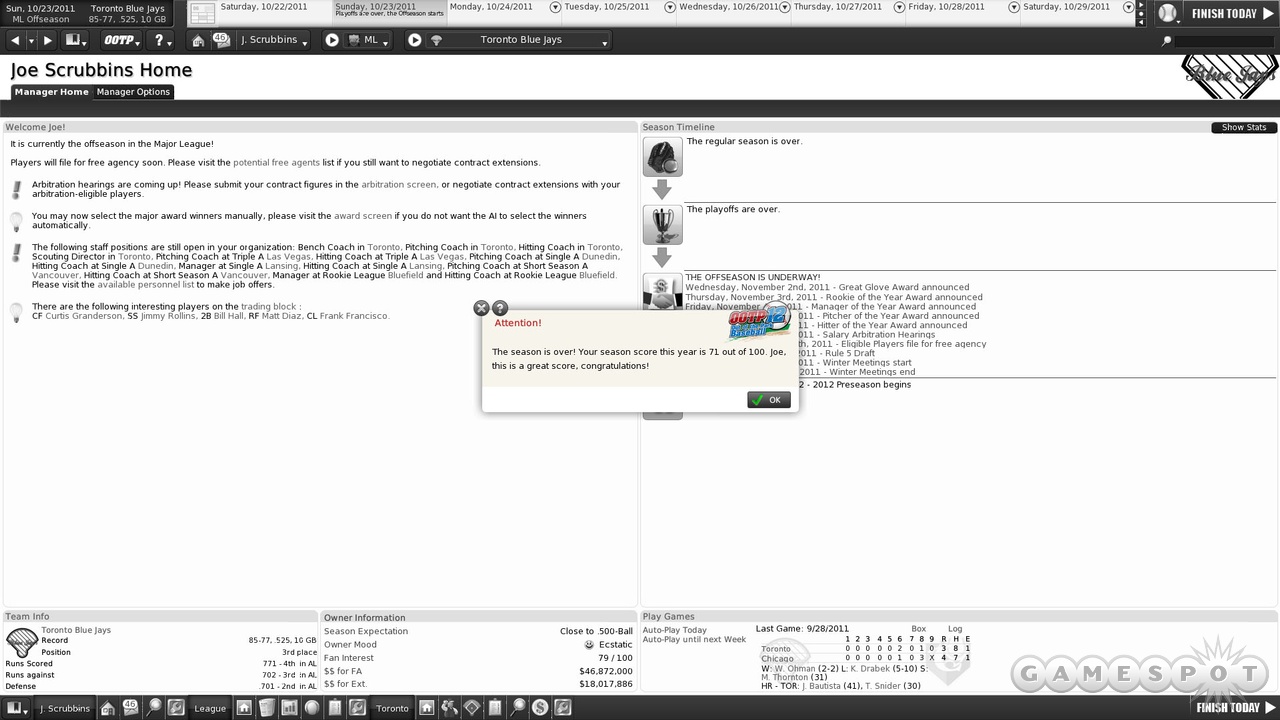Out of the Park Baseball has quietly become one of the most impressive sports franchises in all of gaming. This big league management simulation has been getting better with just about each passing year since the late 1990s, and the recently released 12th version of the game may be the best yet. While there aren't any stop-the-presses moments here that will convert text-game haters, rough spots have been smoothed out and depth has been added. The game continues to wallop you with more numbers than Moneyball and a calculus textbook combined, but hardball diehards can't help but love the deeply satisfying mix of peanuts, Cracker Jacks, and sabermetrics.

First off, though, you might need to start playing Out of the Park Baseball 12 by making an adjustment to how the game launches. The game was initially so broken as to be unplayable, due to a blizzard of errors whenever simming a day or even saving. The fix, at least in our experience, involves simply clicking on the game executable and then selecting the "Run as administrator" option. It isn't clear how widespread this problem might be, but it's severe enough that it can make it tough to get through a single day of MLB action, let alone a full season.
Once you get the game up and running, you find a similar OOTP to that released in 2009 and 2010. This is major league baseball in a box, a hardball universe that lets you join the ballclub of your choice and then manage it for as many seasons as you like. You make the call on just about everything by serving as the bench boss and the GM. Many tasks can be automated, but generally, you set rosters, draw up batting orders, establish pitching rotations, make bullpen assignments, send out trade offers, wheel and deal with free agents, place players on the disabled list, and so forth. The game focuses on the real major leagues, although it also includes a full run of minor clubs, along with real and fictional circuits from all over the planet.
That said, there aren't a load of frills here. The game is completely text based via HTML pages that you navigate just as you would a Web browser. Everything revolves around numbers, which can be daunting unless you are a serious baseball fan who alternates between watching games and studying their outcomes in the stat pages of Baseball America. There is no visual wow here. The closest you come to "graphics" is the manual simulation screen, where you watch games played over a rudimentary diamond and a backdrop photo of the Phillies' Citizens Bank Park and follow the action by reading textual play-by-play while listening to canned crowd noise. This may be the most approachable OOTP yet, with loads of shortcuts on menu screens to keep you from getting lost in the number jungle, but it remains a long way from the friendly confines of an arcade-first sim like MLB 11: The Show.

Still, you don't need pretty pictures to enjoy OOTP 12. The depth is just incredible. Rosters are more thorough than ever, with full major league clubs as they sat on opening day 2011, along with a complete run of prospects, wannabes, and never-weres in A, AA, and AAA. Stats are tracked for just about every conceivable event that can take place on a ball diamond, so you can indulge your inner Bill James to your heart's content. Analyzing statistics and player ratings is key to any success you find on the field, along with some luck that projected ratings actually turn into real-world performance on the field. The most notable change to the artificial intelligence is how your bench bosses and managers fare when asked to fill out lineups. Before, you always got into "Why the hell is that guy batting third?" territory and had to do a fair bit of manual tweaking. Now, it's hard to pick out any serious flaws.
Player ratings are incredibly thorough, including everything from their ability to go deep to how they perform in the clubhouse. Drafting and developing based solely on stats and ratings is a crapshoot because you could easily wind up with a starting nine full of clubhouse cancers with terrible injury ratings or some me-first kids who won't even sign with your team. Little touches like this add strategic depth to building teams because you need to take all of these factors into account before making moves. Even something as potentially dull as the draft is fraught with tension because you always have to make the call on such questions like taking a risk on a potential phenom who is reportedly hard to sign or playing it safe with an average-number guy who is supposed to be easy to ink. Contracts are also much more involved when it comes to negotiating them with the addition of more personality-driven decisions, as well as things like bonus clauses and buyout options. It's all pretty byzantine, though, which makes it hard to figure out how to manage player transactions within your organization at first. At least the game provides lots of advice and warnings so you don't wind up doing something really idiotic, like designating your star shortstop for assignment when you're trying to stick him on the DL.
Storylines have been expanded to include just about everything that happens in the real world. You'll see such things as players taking leaves of absence over the death of a child, getting burned in bizarre kitchen mishaps, and being beaned by out-of-control pitching machines. Star players now have lives outside of baseball, too. As seasons progress, you'll witness such developments as your star shortstop opening up a winery or your speedy center fielder donating a kidney to his brother. Clubhouse tantrums sometimes result in suspensions or even serious injuries for things like punching a locker. You can even encounter weird situations like a prospect being judged older than he claims to be due to odd results of a DNA test, a prospect choosing basketball over baseball like a latter-day Danny Ainge, or a lawnmower accident ending a career due to the loss of a few fingers. This level of detail really sucks you into the game. At the same time, however, out-there situations do not occur often. Stories typically involve things like strained medial collateral ligaments and concussions, so don't worry about the game playing like a telenovela.

Multiplayer has also received some attention this year. The new OOTP makes it easier to get into one of the thousands of online leagues that have sprung up in recent years. You can now find a league within the game itself by logging in with a username and password and then browsing a server that is usually loaded with commissioners that are looking for fresh blood. This is the ideal way to play OOTP, so it's good to see that the developers are making it easier than ever to find a league and experience the cutthroat nature of taking on human rivals rather than the CPU.
Even though Out of the Park Baseball 12 breaks little completely new ground, the revamped rosters, refined AI, and deeper storylines do a lot to overhaul the feel of the game. With so many new ways to interact with your players, the game is more of a human simulator with a lot of numbers than a number cruncher without much of a human face, which makes for a game that is even harder to put down than its already estimable predecessors.